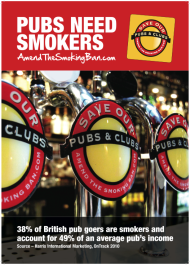As regular readers know, Michael Siegel is a professor at Boston University School of Public Health. With 20 years' experience in tobacco control, he writes a fascinating blog - The Rest of the Story: Tobacco News Analysis and Commentary - which is essential reading for anyone with an interest in the smoking debate.
In his time Siegel has published research on the harmful effects of passive smoking. He has also testified in support of indoor smoking bans in US cities. You might expect him therefore to be another one-eyed anti-smoker, like so many of his colleagues.
Not so. Demonstrating remarkable integrity, both personal and professional, Siegel has put his career on the line by questioning some of the medical claims about passive smoking, and opposing "next step" policies such as outdoor smoking bans.
For his pains he has been shunned by colleagues and accused of taking money from the tobacco industry. Courageously, Siegel has stuck to his guns and his story is featured in a must-read article in this week's New Scientist. Here's a taste:
Siegel's case is perhaps the most clear-cut example of a disturbing trend in the anti-smoking movement. There are genuine scientific questions over some of the more extreme claims made about the dangers of passive smoking and the best strategies to reduce smoking rates, but a few researchers who have voiced them have seen their reputations smeared and the debate stifled.
Putting aside the question of whether such tactics are ethical, they could ultimately backfire. About half of US states and many parts of Europe do not yet ban smoking even indoors in public places like bars and restaurants, so the anti-smoking movement cannot afford to lose credibility.
On the other hand, in some parts of the US, particularly California, the anti-smoking movement has grown so strong that smoking bans outdoors and in private apartments are in force in a few places, and being considered in more. These measures are at least partly based on disputed medical claims, so it is vital their accuracy be determined. But questioning the orthodoxy seems to be frowned on. "It's censorship," says Siegel. "We're heading towards scientific McCarthyism."
Read the full article HERE.
See also an accompanying editorial, The dangers of inhaling dubious facts.
 Saturday, January 9, 2010
Saturday, January 9, 2010  Simon Clark
Simon Clark
 Blogs
Blogs 












